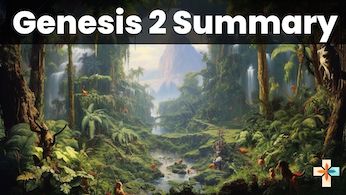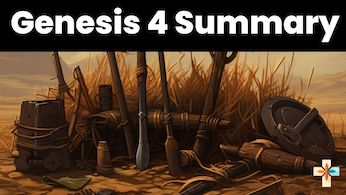Genesis 6 Summary Overview
Genesis 6 recounts the escalation of sin and corruption in humanity and sets the stage for the Great Flood, a divine act of judgment intended to cleanse the earth. This chapter introduces Noah, a righteous man who finds favor with God and is entrusted with the responsibility of preserving human and animal life during the impending flood. Additionally, God limits the human lifespan to 120 years. By examining Genesis 6, we gain insights into the themes of divine judgment, human depravity, and God’s grace, which play significant roles in the unfolding narrative of Scripture.
Genesis 6 Summary Outline
I. The Wickedness of Humanity and the Limitation of Lifespan (Genesis 6:1-4):
- Increase of human population and intermingling of the “sons of God” and “daughters of men.”
- Resulting wickedness leads to the limitation of human lifespan to 120 years.
II. God’s Grief and Decision to Judge the Earth (Genesis 6:5-8):
- God observes the pervasive wickedness and evil inclinations of humanity.
- God regrets creating humanity and decides to bring judgment through a flood.
- Noah finds favor in the eyes of the Lord.
III. Noah’s Righteousness and God’s Instructions (Genesis 6:9-22):
- Noah is described as a just and blameless man who walks with God.
- God instructs Noah to build an ark to preserve life during the flood.
- Detailed instructions for the construction of the ark are provided.
- God establishes a covenant with Noah and promises to save him and his family.
- Noah demonstrates faith and obedience by following God’s instructions precisely.
Conclusion:
- Genesis 6 depicts the depths of human depravity and the need for divine judgment.
- The limitation of human lifespan reflects God’s response to sin.
- Noah’s righteousness stands out amidst the corruption, illustrating the power of faith.
- The Great Flood serves as a reminder of the consequences of sin and the importance of obedience and faithfulness.
- The story of Noah and the ark showcases God’s grace and mercy in the face of judgment.

Where are you on your Spiritual Journey? Discover where you are on your Spiritual Journey in just 60 seconds and find out your next steps.
Take Your Spiritual Journey QuizGenesis 6 Summary – The Corruption of Humanity and the Preparation for the Flood
I. The Wickedness of Humanity and the Limitation of Lifespan (Genesis 6:1-4)
The chapter begins by describing the rapid increase of human population and the intermingling of the “sons of God” with the “daughters of men” (6:1-2). Various interpretations exist regarding the identity of the “sons of God,” ranging from angelic beings to the godly line of Seth. Regardless of the interpretation, the outcome is clear: the mixing of these groups contributes to the pervasive wickedness of humanity (6:4).
In response to the growing corruption, God decides to limit the human lifespan to 120 years (6:3). This declaration marks a significant shift from the long lifespans of the antediluvian patriarchs in Genesis 5.
II. God’s Grief and Decision to Judge the Earth (Genesis 6:5-8)
God observes the wickedness of humanity, with every inclination of the human heart being evil continually (6:5). This state of affairs grieves God to the point that He regrets creating humanity (6:6). As a result, God decides to bring judgment upon the earth in the form of a catastrophic flood, purging the earth of its wickedness (6:7). Amid the corruption, Noah, a righteous man, finds favor in the eyes of the Lord (6:8).
III. Noah’s Righteousness and God’s Instructions (Genesis 6:9-22)
Noah is described as a just and blameless man who walks with God, setting him apart from the wickedness that surrounds him (6:9). God informs Noah of His intention to destroy the earth and provides detailed instructions on the construction of the ark, a massive vessel designed to preserve human and animal life during the flood (6:13-16).
God establishes a covenant with Noah, promising to save him, his family, and representatives of every living creature on the ark (6:18). Noah demonstrates his faith and obedience by following God’s instructions precisely, constructing the ark and gathering the designated animals (6:22).
Conclusion:
Genesis 6 paints a vivid picture of the depths of human depravity, the limitation of the human lifespan, and the necessity for divine judgment. The Great Flood serves as a stark reminder of the consequences of sin and the importance of obedience and faithfulness in our relationship with God. In the midst of humanity’s corruption, Noah stands out as a beacon of righteousness, illustrating the power of faith to preserve and protect in the face of judgment.
As we reflect on the events and lessons of Genesis 6, we are reminded of the seriousness with which God regards sin and the lengths He is willing to go to eradicate it. The limitation of the human lifespan to 120 years serves as a tangible expression of God’s response to sin. At the same time, the story of Noah and the ark highlights God’s grace and mercy, offering hope and salvation even in the midst of judgment.
Michael Ayers
As a dedicated single father, author, teacher, and web developer, I've built a successful entrepreneurial career. I'm responsible for designing, coding, writing, and producing all the content on this website and have generated over 1,000,000 plus page views on all the websites I manage. I hope you enjoy this site.
Where are you on your Spiritual Journey? Discover where you are on your Spiritual Journey in just 60 seconds and find out your next steps.
Take Your Spiritual Journey Quiz

